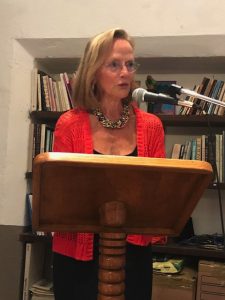I’ve often thought it would have been a mercy if he’d murdered me. Then, he might have told our daughter that her mother was a good person — “… too bad she died so young; such a tragic accident; icy roads, treacherous weather, faulty brakes…” – or whatever. Instead, he left me to live with the pain of not knowing where she was or how she was, for years and years, while he filled her young mind in all that time with lies, which she had no choice but to believe were true.
Later, years later, after I found her and I tried to refute the lies he’d told her – among them that I was a “bad person” and he’d had to go to great, “heroic,” lengths to “protect her” from me – she insisted, vehemently, “My father would never lie to me!” It’s taken me many more years to realize he was telling her his truth. He’d come to believe, with religious fervor, his own lies. How else could he have lived with himself and justified his cruelty? Cruelty not just to me but also to her.
After I found her, that is, after my book Somewhere Child was published by Viking Press and the book, miraculously, found her, she made me vow, as a condition of our possible ongoing relationship, that I would never speak of or write about her father or the past again. I felt I had no choice but to comply. I believed I could show her who I was over time, without needing to explain in spoken or written words.
I wanted so much to reconnect with her, to heal both of our deep wounds, to repair the bond he’d so effectively broken. She was silencing me, I know now. But I felt at the time, after so many years of anguish, that that was a small price to pay.
This story is long, torturous, and unending. I won’t – I can’t – revisit it all here. (In recent years I’ve touched on the subject of parental alienation in WOW views. You can find them by searching my blog’s archives for “Transformation,” “Little People,” and “Mothers and Daughters.”) Suffice it to add just this now:
In my experience, something happens to a woman when she turns seventy. She turns a corner. She becomes braver, bolder. She rips off the muzzle and tosses it aside. She can no longer be silenced. She’s come to realize, slowly, painfully, that silence is capitulation – in my case, surrendering to lies. Silence is acquiescence. Silence does great harm. I can no longer be silent. I cannot let her father’s evil lies outlive me.
When Somewhere Child was published in 1981, when my daughter was still missing, I learned from countless readers’ letters forwarded to me by Viking Press that I’d written my story not only for myself but for all the other parents whose children had been stolen. Writers, by default, I found, can become spokespeople for a cause. Somewhere Child helped to raise consciousness about parental child snatching in the United States, and it helped to change laws.
What if I had remained silent then?

I was reminded of the profound harm of silence in the face of injustice this week, when I heard Jennifer Clement, President of PEN International, read “The PEN International Women’s Manifesto” at the San Miguel Writers Conference here in San Miguel de Allende, Mexico, last Sunday night. This manifesto, I later learned, was passed unanimously by all the PEN Centers at the PEN World Congress in 2017. Since then it has been translated into 27 languages. (See the full text of the manifesto at www.piwwc.org .)
The following passage from the Women’s Manifesto hit me like an epiphany when I heard it last Sunday:
“PEN believes that the act of silencing a person is to deny their existence. It is a kind of death. Humanity is both wanting and bereft without the full and free expression of women’s creativity and knowledge.”
My daughter and I have not spoken in several years. It appears we’ve become permanently estranged. I have not succeeded in healing our wounds. But life for both of us must go on. I know where she is and how she is, and she knows how to reach me if she should care to. This is a blessing. For the remaining years of my life, I know now, too, I cannot, will not, must not live a kind of death.
